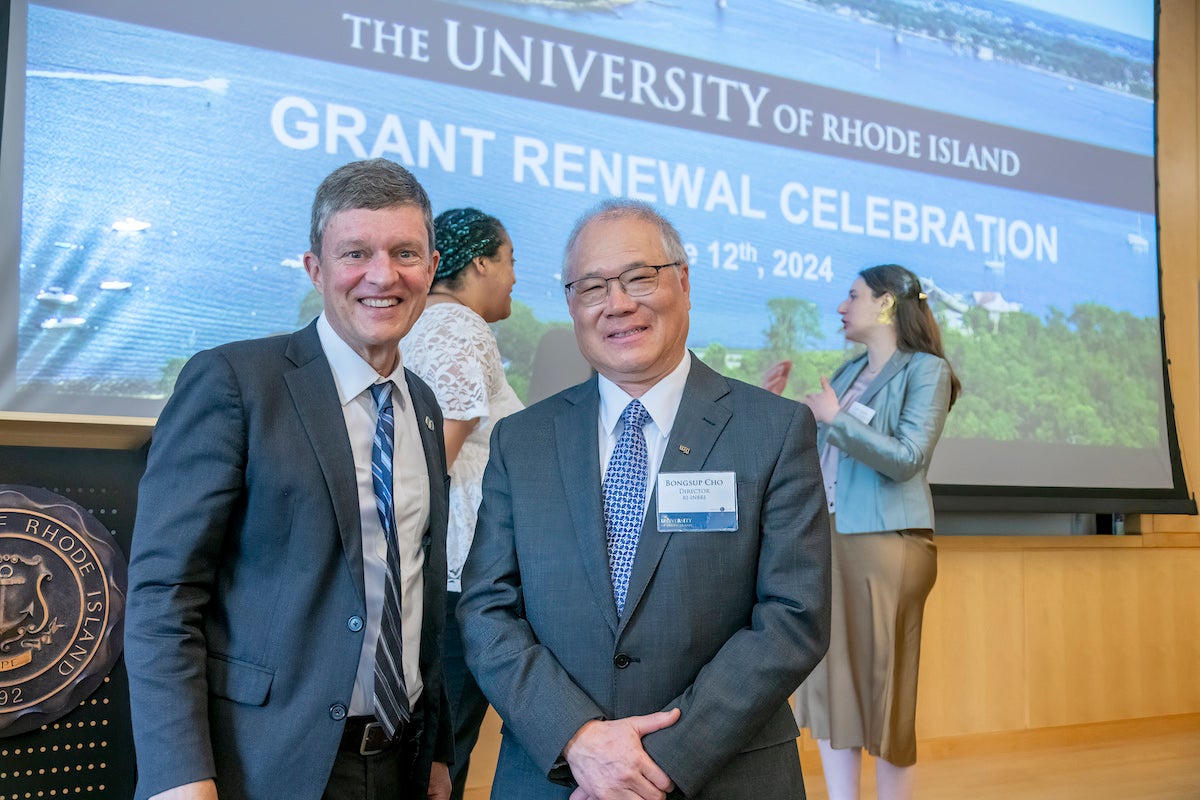Latest round of funding increases URI-based program’s investment in biomedical research to more than $100 million since 2001
The University of Rhode Island announced today that it has secured a five-year, $21 million grant from the National Institutes of Health to support the Rhode Island IDeA Network of Biomedical Research Excellence program from 2024 to 2029. This latest grant raises RI-INBRE’s investment in biomedical research and training in the state to more than $100 million since the program’s inception in 2001.
RI-INBRE promotes biomedical research at academic institutions across Rhode Island, including URI, Bryant University, Brown University, Johnson & Wales University, Rhode Island College, Community College of Rhode Island, Providence College, Roger Williams University, and Salve Regina University. Headquartered on URI’s Kingston Campus, the program provides faculty research and development support through research grants and student training awards for investigators across the state. Originally created to support biological, chemical, and pharmaceutical sciences, the program has expanded to include neuroscience, engineering, biotechnology, nursing and other health and environmental sciences, according to Director and URI College of Pharmacy Professor Bongsup Cho.
“RI-INBRE provides the environment that enables unique opportunities for networking, faculty development, student training, and resource sharing in Rhode Island. This has nurtured a vibrant community of researchers dedicated to advancing biomedical science,” Cho said. “This is a highly productive collaboration between federal and state entities, academia, and industry. It’s been a wonderful partnership that continues to increase biomedical research funding and capacity in Rhode Island. We are grateful to the Rhode Island Congressional delegation—U.S. Senators Jack Reed and Sheldon Whitehouse and Congressmen Seth Magaziner and Gabe Amo—for their continued support of this program and our important work.”
As the disciplines and research investment have expanded, so has INBRE’s impact on biomedical science and job growth in the state. Supported by a Rhode Island Department of Labor and Training Real Jobs RI grant, RI-INBRE recently established a workforce development program offering intensive training in biomedical skills to equip students with the expertise needed to thrive in the local biotechnology industry. In addition, the program’s Centralized Research Core Facility on the Kingston Campus offers access to state-of-the-art research equipment for academic and industry investigators across the state.
“As Rhode Island’s flagship public research university, I am so proud to have INBRE’s home right here at URI, and I am proud that our work is being recognized at the federal level,” said URI President Marc Parlange during an event June 12 to announce the funding. “It’s a true collaboration between all our colleges and universities and I want to thank all of you for your continued efforts in biomedical research.”
U.S. Sen. Jack Reed delivered video remarks during the event, touting the significant impact RI-INBRE has already had on scientific breakthroughs, as well as those that are to come through the training of future researchers.
“I want to thank President Parlange and Dr. Bongsup Cho for their continued leadership in ensuring Rhode Island is well positioned to help lead research breakthroughs and train tomorrow’s biomedical workforce right here in our state,” Reed said. “I am so pleased to celebrate the renewal of the federal grant to continue this important work over the next five years. This source of funding has been critical for bringing resources for biomedical research to our state and ensuring we have a workforce to continue these efforts for years to come.”
In its 23 years, the program has supported 802 research projects involving 218 faculty members, who have trained 2,210 undergraduate students, graduate students, and postdoctoral fellows.
“By bridging the gap between academia and industry, RI-INBRE is shaping the future workforce and driving economic growth in our state,” Cho said. “We will be training not only students, but also incumbent employees already working in the biotech industry. These collaborations and joint initiatives have fostered a culture of innovation, leading to scientific discoveries and improved health outcomes for our community, a testament to the quality and diversity of our research endeavors. RI-INBRE has become an engine of economic prosperity, bolstering Rhode Island’s position as an essential player in biomedical and life sciences.”
“This recent renewal of the RI-INBRE program by the National Institutes of Health is a gratifying acknowledgment of the innovation, hard work, and dedication of the University of Rhode Island and partnering institution faculty and staff,” added Michael Lynes, chair of the RI-INBRE External Advisory Committee and University of Connecticut molecular and cell biology professor.

